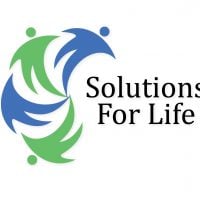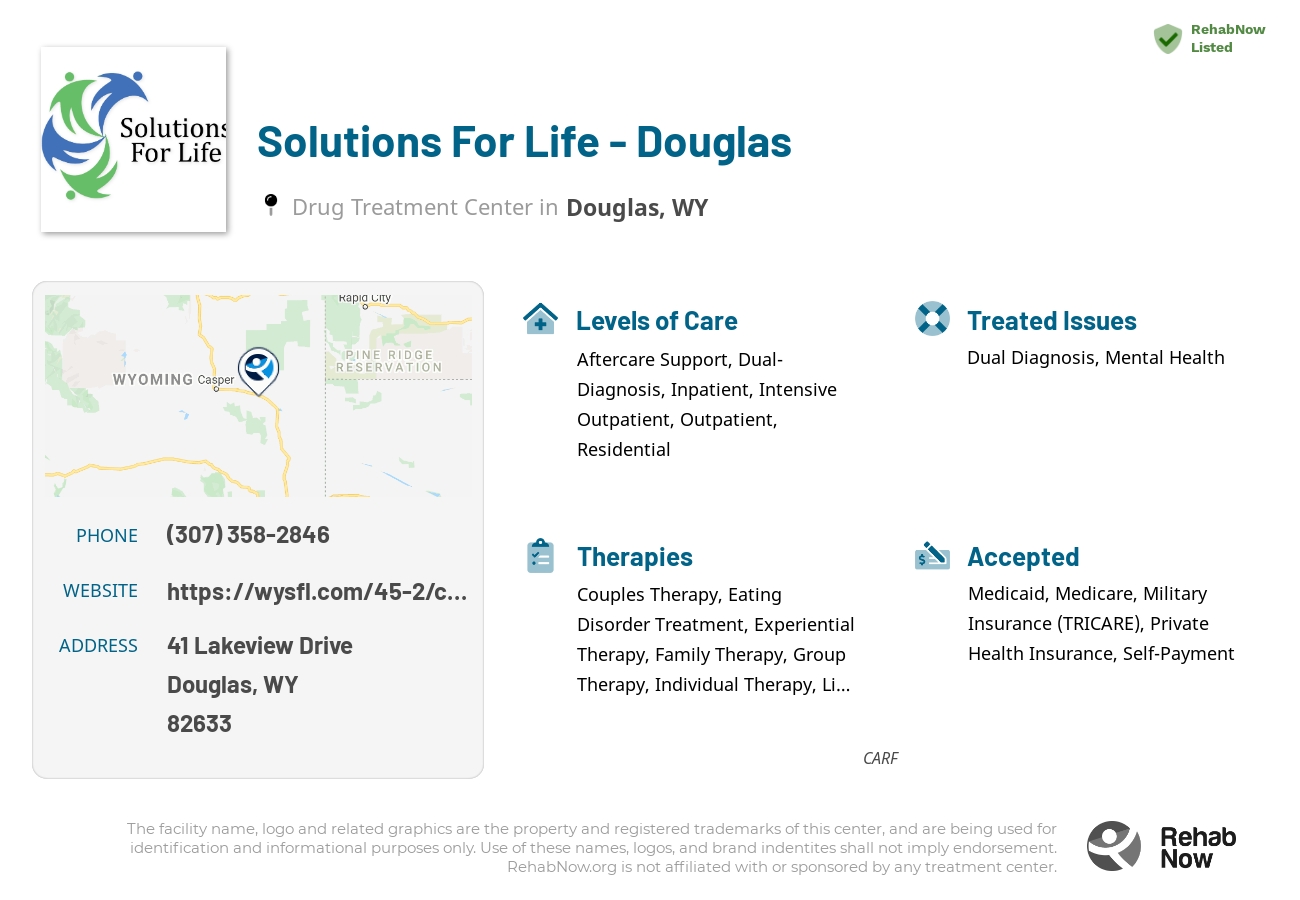Solutions For Life - Douglas
Drug Rehab Center in Douglas, Wyoming
Solutions For Life - Douglas is a comprehensive addiction recovery center in Douglas, Wyoming, providing evidence-based psychiatric and therapeutic approaches, personalized treatment protocols, and a supportive environment to individuals and families affected by addiction and substance abuse.
About Solutions For Life - Douglas in Wyoming
Solutions For Life - Douglas is a comprehensive addiction recovery center in Douglas, Wyoming, dedicated to providing the best care for individuals and families affected by addiction and substance abuse. Through evidence-based psychiatric and therapeutic approaches, Solutions for Life - Douglas provides interventions for a range of mental health, substance abuse, and behavioral health issues. They offer a compassionate and supportive environment where individuals are encouraged to take the first steps on their journey toward recovery.
Solutions For Life - Douglas is dedicated to providing personalized treatment protocols designed to meet the needs of each individual. They offer individual and group counseling, life skills coaching, and relapse prevention plans. Additionally, they provide case management, family therapy, and community outreach services. Through their evidence-based approach, individuals are able to develop new coping strategies to deal with adversity and build a foundation for lasting recovery.
In addition to their comprehensive services, Solutions For Life - Douglas is accredited by the national treatment facilities accreditation program CARF. They also offer a unique peer support program, in which individuals in recovery can learn from each other's successes and struggles in order to create a stronger support system. Their facility is also licensed by the Wyoming Office of Behavioral Health and is approved by the courts to provide court ordered treatment services. Solutions For Life - Douglas is committed to providing the highest quality care for those affected by addiction and substance abuse.
Genders
Ages
Modality
Additional
Accreditations

CARF
The Commission on Accreditation of Rehabilitation Facilities (CARF) is a non-profit organization that specifically accredits rehab organizations. Founded in 1966, CARF's, mission is to help service providers like rehab facilities maintain high standards of care.
Conditions and Issues Treated
Recovery is not simply about stopping drug use. Recovery is working with addiction while recovering mental health issues that are fueling the addiction in the first place.
Levels of Care Offered
This center offers a variety of custom treatment tailored to individual recovery. Currently available are Aftercare Support, Dual-Diagnosis, Inpatient, Intensive Outpatient, Outpatient, Residential, with additional therapies available as listed below.
Individuals who are suffering from severe addiction or have a high risk for dangerous health concerns are often recommended to receive inpatient treatment.
Choosing to enter an inpatient treatment program is beneficial for people who are suffering from severe addiction, or who have a high risk for dangerous health concerns.
Inpatient treatment is beneficial for:
- People who have a history of severe withdrawal.
- People who have attempted to overcome addiction on their own without success.
- People who have a history of relapse, or have recently relapsed.
- People at risk for drug overdose or withdrawal-related complications.
- People with medical conditions that are worsened by drug or alcohol use.
Addicts who need help with their addiction can enroll in an intensive outpatient program (IOP). But the patient won’t live there during treatment.
IOP involves patients visiting a medical office building regularly for therapy and other services while continuing to live their lives.
IOP is a step up from drug or alcohol detox, but it’s still a phase of recovery, not the end goal. Patients in need of IOP have many options for rehab and treatment.
Outpatient treatment is considered the lower intensity level of addiction treatment. It’s ideal for early phase addiction or lower intensity addictions. It may include weekly sessions instead of daily. It may include weekly sessions instead of daily. Peer group support, 12-step programs, and individual counseling may still be involved but at a lesser frequency than an intensive outpatient program. It is a good choice for someone who doesn’t need to go through a medically supervised detox and who has a supportive home environment. It requires motivation and dedication to commit to the program without constant monitoring.
Residential treatment programs are those that offer housing and meals in addition to substance abuse treatment. Rehab facilities that offer residential treatment allow patients to focus solely on recovery, in an environment totally separate from their lives. Some rehab centers specialize in short-term residential treatment (a few days to a week or two), while others solely provide treatment on a long-term basis (several weeks to months). Some offer both, and tailor treatment to the patient’s individual requirements.
Aftercare support should take place after outpatient treatment has ended. There are a few different types of aftercare support that patients can seek. These include 12 Step, Self-help groups (AA, NA), Therapeutic communities, Long-term, structured sober living arrangements, and Halfway houses (residential treatment centers).
Therapies & Programs
Individual therapy involves one-on-one sessions between the patient and therapist. It provides patients with a safe environment to openly discuss personal and sensitive issues with the therapist. They find the therapist as someone they can trust. Individual therapy aims to identify the core issues that would have led the patient to substance abuse and address them effectively. The therapist can develop patient-specific customized solutions through individual therapy, which aids speedier recovery.
Couples therapy works with clients and significant others in a professional capacity to improve relationship dynamics. This can be helpful for addicts who are trying to marry the idea of recovery into their work, family, social lives – any aspect that has to do with relationships.
Through counseling sessions, addicts will have an opportunity to talk about their addiction with professional partners. These partners can offer feedback and advice on how to get sober while keeping healthy relationships intact. A good couples therapist will help addicts understand their part in an unhealthy relationship dynamic or find ways to deal with anger or resentment from significant others outside of the home.
Family therapy is a group problem-solving that aims to improve communication and relationships between the addict, their family, and sometimes friends. The main goal of family therapy for drug addiction is to create an environment where communication can occur without judgment, hostility, or blame. The therapist is with the family as they learn to communicate differently, especially with the addict when s/he is using. The family can learn to reduce their enabling behavior or rally together and support each other during tough times.
An addict’s family can play a vital part in helping them to avoid relapse because they can spot the warning signs and help them get back on track before it becomes too much of a problem. Family therapy is one of the most effective ways to help addicts stay on the path to long-term sobriety. When a drug addict decides that they want to try and get sober, it takes the support of every person they love to succeed. It can be incredibly difficult for loved ones to watch an addict go through the pain and suffering of withdrawal, but by being there with them and supporting them, they can help to make sure that the addiction never returns.
Groups typically involve meetings with other recovering addicts who can relate to one another’s experiences. They might meet in person or online and typically focus on the process of staying sober rather than overcoming a specific addiction.
In these groups managed by Solutions For Life - Douglas, addicts can build a sense of community and develop strong emotional connections with others who understand what they are going through. These beneficial relationships can help addicts overcome their cravings and prevent relapse at any point during the recovery process.
In general, trauma therapy is a clinical process that helps individuals deal with mental stress often caused by traumatic events. The therapist helps the person identify, understand, and work through the problem. This is done with the help of talking about it in group or one-on-one counseling sessions. Therapists use relaxation, role-playing, art, and music to help the person open up about what is bothering them.
There are many different types of trauma therapists, such as psychiatric nurses and counselors. Not everyone is a good candidate for this type of therapy; it is generally reserved for people who have recently experienced a traumatic event and struggle to get over it. It is often done for children, teenage victims of sexual assault, and war veterans.
There is hope for people who are addicted to drugs and alcohol. Cognitive Behavioral Therapy (CBT) is the solution. CBT focuses on the underlying thoughts and behaviors that caused the addiction problem in the first place and may cause a relapse. This type of psychotherapy addresses negative feelings common in substance abuse disorders. It helps to change them by restructuring thought patterns. It’s about removing negative thoughts and providing long-term benefits while promoting self-awareness, self-control, and healthy ways to respond to negative thoughts. These sessions can be done by themselves or as part of combination therapy.
Since addiction is a chronic physical and mental illness, addicts need to learn as many life skills as possible. Many drug treatment centers offer life skills activities as part of their addiction recovery programs. Examples include cooking classes, employment training, resume writing seminars, parenting classes, and computer training. Life skills activities help addicts find employment, take care of their families, and give back to the community.
Patient Experience
Experiential Therapy at Solutions For Life - Douglas
Experiential Therapy teaches people how to think differently about their lives and change their emotions by changing their behavior. This type of treatment is accomplished with various activities that may involve acting, props, arts and crafts, animal care, or other tools that may be effective.
This therapy aims for patients to release suppressed thoughts that cause bad feelings and drug addiction. Role-playing, arts and crafts, music, animal care, rock climbing, etc., are some of the activities used in this therapy. Gradually an individual will feel calmer and more loving which will change their perception positively. In addition to treating drug addiction, experiential therapy is beneficial for different behavioral and eating disorders.
Payment Options Accepted
For specific insurance or payment methods please contact us.
Is your insurance accepted?
Ask an expert, call (888) 674-0062
Solutions For Life Associated Centers
Discover treatment facilities under the same provider.
- Solutions For Life in Douglas, WY
- Solutions For Life - Lusk in Lusk, WY
- Solutions For Life - Glenrock in Glenrock, WY
Learn More About Solutions For Life Centers
Additional Details
Specifics, location, and helpful extra information.
Douglas, Wyoming 82633 Phone Number(307) 358-2846 Meta DetailsUpdated November 25, 2023
Staff Verified
Solutions For Life - Douglas Patient Reviews
There are no reviews yet. Be the first one to write one.
Douglas, Wyoming Addiction Information
Wyoming has some of the highest rates of alcohol abuse and/or dependency in the nation. Drug and alcohol rehabilitation and treatment are so low that the state ranks 48th in the for admittance to drug and alcohol rehab. Marijuana use remains illegal in Wyoming, both for medical and recreational use, but is the second-largest drug threat in the state.
Treatment in Nearby Cities
- Rock Springs, WY (209.4 mi.)
- Powell, WY (216.9 mi.)
- Thermopolis, WY (153.8 mi.)
- Gillette, WY (107.2 mi.)
- Afton, WY (279.7 mi.)
Centers near Solutions For Life - Douglas
The facility name, logo and brand are the property and registered trademarks of Solutions For Life - Douglas, and are being used for identification and informational purposes only. Use of these names, logos and brands shall not imply endorsement. RehabNow.org is not affiliated with or sponsored by Solutions For Life - Douglas.



